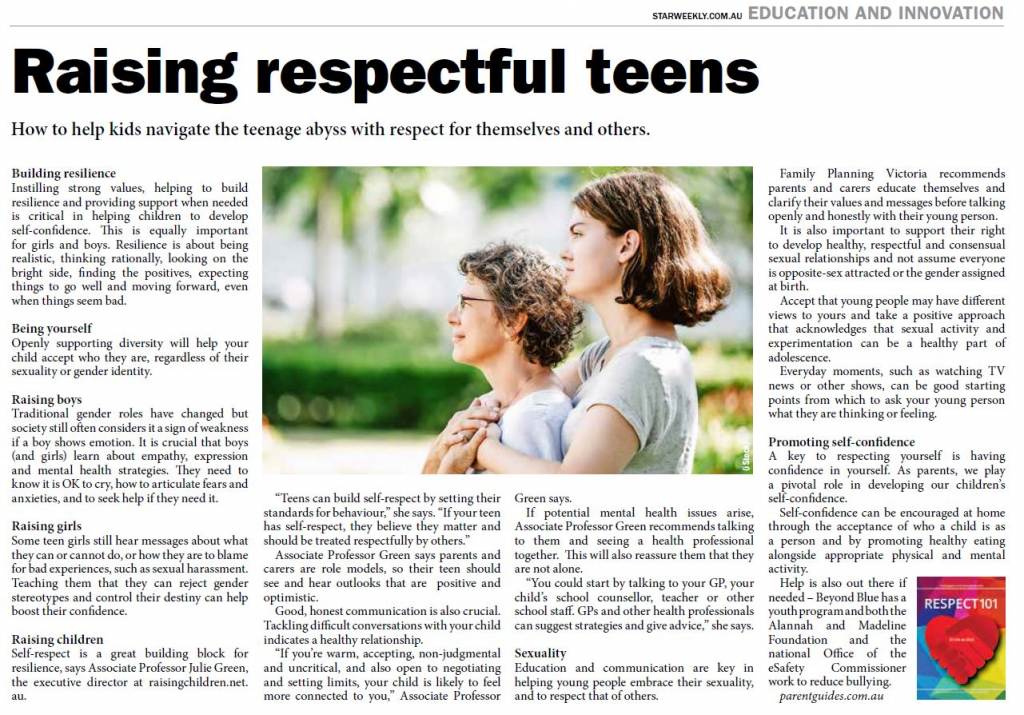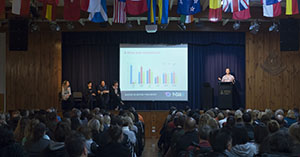Recently, Parent Guides was featured in the Star Weekly and Domain Magazine. See the full article below along with clippings and images of the article attached.

How to help kids navigate the teenage abyss with respect for themselves and others.
Building resilience
Instilling strong values, helping to build resilience and providing support when needed is critical in helping children to develop self-confidence. This is equally important for girls and boys. Resilience is about being realistic, thinking rationally, looking on the bright side, finding the positives, expecting things to go well and moving forward, even when things seem bad.
Being yourself
Openly supporting diversity will help your child accept who they are, regardless of their sexuality or gender identity.
Raising boys
Traditional gender roles have changed but society still often considers it a sign of weakness if a boy shows emotion. It is crucial that boys (and girls) learn about empathy, expression and mental health strategies. They need to know it is OK to cry, how to articulate fears and anxieties, and to seek help if they need it.
Raising girls
Some teen girls still hear messages about what they can or cannot do, or how they are to blame for bad experiences, such as sexual harassment. Teaching them that they can reject gender stereotypes and control their destiny can help boost their confidence.
Raising children
Self-respect is a great building block for resilience, says Associate Professor Julie Green, the executive director at raisingchildren.net.au. “Teens can build self-respect by setting their standards for behaviour,” she says. “If your teen has self-respect, they believe they matter and should be treated respectfully by others.” Associate Professor Green says parents and carers are role models, so their teen should see and hear outlooks that are positive and optimistic. Good, honest communication is also crucial. Tackling difficult conversations with your child indicates a healthy relationship. “If you’re warm, accepting, non-judgmental and uncritical, and also open to negotiating and setting limits, your child is likely to feel more connected to you,” Associate Professor Green says. If potential mental health issues arise, Associate Professor Green recommends talking to them and seeing a health professional together. This will also reassure them that they are not alone. “You could start by talking to your GP, your child’s school counsellor, teacher or other school staff. GPs and other health professionals can suggest strategies and give advice,” she says.
Sexuality
Education and communication are key in helping young people embrace their sexuality, and to respect that of others. Family Planning Victoria recommends parents and carers educate themselves and clarify their values and messages before talking openly and honestly with their young person. It is also important to support their right to develop healthy, respectful and consensual sexual relationships and not assume everyone is opposite-sex attracted or the gender assigned at birth. Accept that young people may have different views to yours and take a positive approach that acknowledges that sexual activity and experimentation can be a healthy part of adolescence. Everyday moments, such as watching TV news or other shows, can be good starting points from which to ask your young person what they are thinking or feeling.
Promoting self-confidence
A key to respecting yourself is having confidence in yourself. As parents, we play a pivotal role in developing our children’s self-confidence. Self-confidence can be encouraged at home through the acceptance of who a child is as a person and by promoting healthy eating alongside appropriate physical and mental activity. Help is also out there if needed – Beyond Blue has a youth program and both the Alannah and Madeline Foundation and the national Office of the eSafety Commissioner work to reduce bullying.




